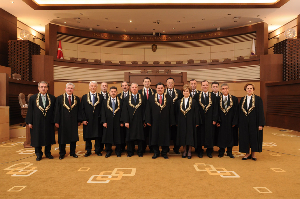What the Columnists Say
The question that continues to preoccupy many commentators in the Turkish press is the direction that President Erdoğan is taking Turkey. Baskın Oran, a leading political scientist and pundit, drew a historical parallel to the epochs of Atatürk and the sultan Abdülhamid II, noting that Erdoğan is copying Atatürk in his methods, while copying Abdülhamid II ideologically. Meanwhile, the statement that General Necdet Özel, the Chief of the General Staff of the Turkish military, made during the official state reception on August 30 that the military is held in the dark about the peace negotiations between the government and the Kurdish movement and that the military is going to react if its “red lines” are crossed, was welcomed in a comment in the daily Zaman. It was noted that the words of the military deserves to be listened to and that a solution that lacks the support of the armed forces does not stand any chance of success.

The Balyoz Retrial and the Changing Politics of Turkish Justice
By Gareth Jenkins (vol. 7, no. 12 of the Turkey Analyst)
On June 18, 2014, the Turkish Constitutional Court ordered a retrial in the infamous Balyoz, or “Sledgehammer”, case in which 237 serving and retired military personnel were convicted of plotting to stage a coup to overthrow the government of the Justice and Development Party (AKP). The retrial appears likely to result in the acquittal of the accused. However, the timing of the Constitutional Court’s decision has done little to allay concerns about the politicization of the Turkish judicial system.

What the Sledgehammer Sentences Mean
By Halil M. Karaveli (vol. 5, no. 18 of the Turkey Analyst)
The sentences in the Sledgehammer trial demonstrate the subjugation of the military to civilian, democratic, legal authority. But at the same time, it is not in the interest of the government of the Justice and Development Party (AKP) that the officer corps is further demoralized. Prime Minister Recep Tayyip Erdoğan no longer has an interest in wielding a sledgehammer against the military. The outcome of the trial of the generals must be viewed against the backdrop of the new power struggle that rages in Turkey, between the AKP and the movement of Fethullah Gülen.
Erdogan's Invitation to Gulen: Reconciliation or Power Play?
By Gareth H. Jenkins (vol. 5, no. 13 of the Turkey Analyst)
On June 14, 2012, Prime Minister Recep Tayyip Erdoğan publicly invited Fethullah Gülen, the leader of the powerful Gülen Movement, to return to Turkey from self-imposed exile in the United States. On June 16, 2012, in a videoed interview, Gülen declined the invitation, breaking down in tears as he expressed his fears that his return could be exploited to destabilize the country and damage his movement’s achievements. In recent months, Erdoğan and members of the Gülen Movement have been engaged in a bitter power struggle. As a result, Erdoğan’s invitation to Gülen was interpreted by some commentators as a reconciliatory peace offering. However, it would probably be more accurate to interpret it as a challenge to Gülen, an assertion of authority in the guise of a magnanimous gesture.
Football and Fethullah: the Gulen Movement's New Goals?
By Gareth H. Jenkins (vol. 5, no. 11 of the Turkey Analyst)
On May 12, 2012, Istanbul rivals Fenerbahçe and Galatasaray played out a goalless draw in the final match of the Turkish 2011-2102 soccer season, handing the national championship to Galatasaray. After the match, Fenerbahçe fans took to streets and to social networking media such as Twitter to protest that they had been robbed. Much of their ire was directed at the Gülen Movement, the followers of the Islamic preacher Fethullah Gülen, who has been living in exile in Pennsylvania in the U.S. since 1999. It was the Gülen Movement, they claimed, that was behind a massive investigation into match-fixing first launched in July 2011 that had been primarily directed primarily at Fenerbahçe, severely disrupting its on-field and off-field activities and resulting in club chair, Aziz Yıldırım, spending the entire season behind bars.




